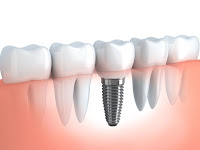A dental inplant is an artificial tooth root replacement and is used in prosthetic dentistry to support restorations that resemble a tooth or group of teeth.
Dental inplants are usually casted out of titanium, a metal that is fully accepted by the human body. The inplant is inserted into the jawbone in place of a missing tooth.
An extension is then secured to the inplant and a new crown is placed to match the colour and contours of the existing teeth.
Inplants also enable crowns and bridges to be solidly held in place over an extended period of time - usually for a lifetime - and look, feel and function like real teeth.
Inplant surgery is typically performed as an outpatient under general anesthesia or with Local anesthesia by trained and certified clinicians including general dentists, oral surgeons, and periodontists. An increasing number of general or cosmetic dentists as well as prosthodontists are also placing implants in relatively simple cases.
The most common treatment plan calls for several surgeries over a period of months, especially if bone augmentation (bone grafting) is needed to support implant placements. At the other end of the surgery scale, some patients can be implanted and restored in a single surgery, in a procedure labeled "immediate function" and "teeth in an hour."
The conventional methods of replacing missing teeth are Bridges or Dentures.
Bridges usually involve sticking false teeth onto our existing teeth. This may involve filing down healthy teeth to act as retainers which may compromise the health of these teeth. Bridges can also only be provided when there are sufficient strong remaining teeth. They are however a permanent replacement, although they are likely to need replacement every 10 to 15 years.
Dentures are teeth attached to a plastic or metal plate. They can often be cumbersome as they have to be taken in and out every day and for cleaning. They may not always retain in place well if the shape of the gums and bone in the mouth is not appropriate.
Though bridges and dentures can serve us satisfactorily, Dental inplants provide better support and usually results in more comfortable and stable replacement teeth. It provides better chewing efficiency and allows us to have permanent fixed teeth without trimming our own natural teeth for support, or having to remove the teeth every day.
Dental inplants also slow down the shrinkage of our jawbone which occurs as a result of tooth loss.
Dental inplants prices
The price of dental implants tends to vary considerably and depends on several factors including the level of skill of the surgeon, the type (quality) brand of implant used, the clinic where the treatment is carried out, the level of aftercare service provided and obviously the amount of work required (i.e bone grafting) and number of implants required. In the UK the costs of a single tooth implant can vary from £800.00 up to £3000.00.
But in the Central European Region in Hungary or in Poland the costs of a single tooth implant can vary from £300.00 up to £2000.00.
We must underline that the price of dental implant is not the most important argument to consider when choosing a cheap dental implant service abroad. The most important arguments are the quality of the treatments and the reliability of the implant surgery clinic abroad. Dental implant price comparison should only be done after choosing a few surgery clinics that reach the required level of quality and reliability.

Megjegyzések